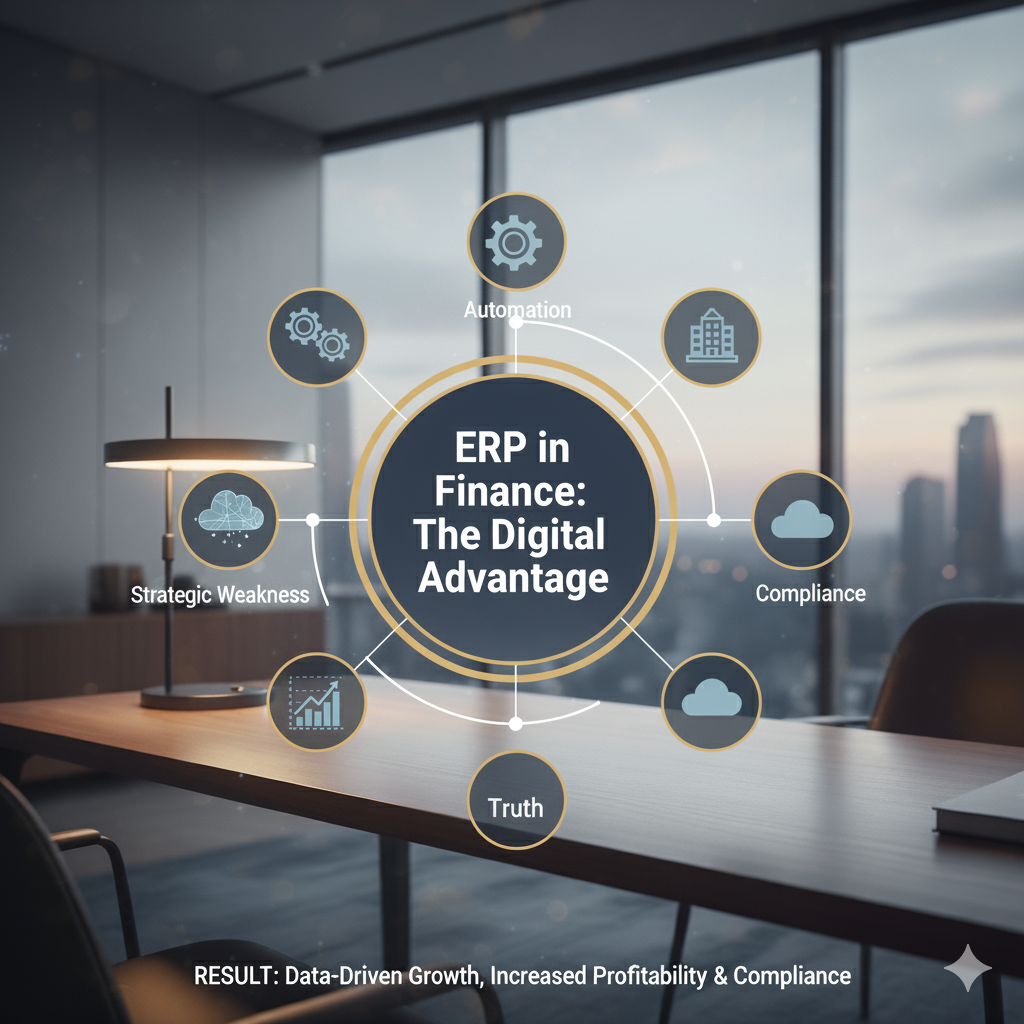What is an ERP system in finance, and how does it work?
The most important part of any successful business is how it handles its money. It is very important that financial data is accurate and easy to get to, from keeping track of daily transactions to making long-term plans. But a lot of businesses still have to deal with spreadsheets that don’t connect, department data that is kept separate, and manual processes that take a lot of time and are easy to make mistakes. This is where an Enterprise Resource Planning (ERP) system really makes a difference.
An ERP system brings together different parts of a business into one platform that works well. In finance, it turns a messy collection of ledgers, invoices, and reports into a single source of truth. This gives you the best view and control over a company’s financial health. The first step to making your business more efficient, making better decisions, and becoming more resilient is to learn what an ERP system is in finance. This guide will explain how ERP works in finance and accounting, what its main parts are, and how it can help your business in real ways.
What does ERP mean in finance?
Let’s make sure we understand the terms before we go on. ERP stands for Enterprise Resource Planning. The full form of “ERP” shows what it is meant to do: help a business make the best use of its resources, like money, people, and inventory.
So, what does an ERP system do for a business? It’s a way of organizing software so that all of a business’s data is stored in one central database. This makes it easy for different departments to access and share information. When we talk about an ERP in finance, we’re talking about how this technology is used to keep track of all of a company’s money. It is like the brain for financial data, linking everything from simple bookkeeping to complicated strategic forecasting.
Main Parts of an ERP Finance System
The modular design of an ERP is what makes it so powerful. Companies can use only the modules that work best for them. For finance and accounting, there are a few core modules that are necessary for daily operations and long-term planning.
General Ledger (GL)
The General Ledger is the heart of any accounting system, and it’s the central pillar of the finance module in ERP. It keeps a full record of all financial transactions, which are organized into a chart of accounts.
- Centralized Data: The GL combines information from all the other financial sub-modules, such as Accounts Payable and Receivable, to give a full, real-time picture of the company’s finances.
- Financial Reporting: It is the main source for making important financial statements like the balance sheet, income statement, and cash flow statement. You can usually make these reports with an ERP in just a few clicks.
Accounts Payable (AP)
The Accounts Payable module makes it easier to pay suppliers and vendors. It takes care of everything from processing invoices to making payments, which cuts down on the amount of work that needs to be done by hand and lowers the chance of mistakes or late fees.
- Invoice Management: AP modules can take in invoice data, check it against purchase orders and receipts (a process called three-way matching), and send it on for approval.
- Payment Processing: It streamlines the payment process, handling various payment methods and schedules to optimize cash flow and take advantage of early payment discounts.
Accounts Receivable (AR)
Conversely, the Accounts Receivable module automates the process of managing money owed to the company by its customers. This is very important for keeping cash flow healthy.
- Billing and Invoicing: This module makes and sends invoices to customers, keeps track of payments, and sets credit limits.
- Collections Management: It helps finance teams keep an eye on overdue accounts, send automated payment reminders, and run the collections process more smoothly.
Making a budget and predicting the future
This module helps businesses make plans for the future. It lets finance teams make detailed budgets, see how actual performance compares to budgeted figures, and make complex financial predictions.
- Collaborative Budgeting: ERP systems let different departments work together to make the budget in a safe and organized way.
- Scenario Planning: Teams can use “what-if” analysis to model different financial scenarios and see how different business decisions might affect future performance.
Managing Assets
The asset management module is very important for businesses that have a lot of physical assets, like vehicles, machinery, or IT equipment. It tracks the entire lifecycle of an asset, from acquisition to disposal.
- Depreciation Calculation: The module automatically figures out how much an asset has lost value over time using different methods, making sure that it follows accounting rules.
- Asset Tracking: It helps keep an accurate list of all the company’s assets, where they are, what condition they’re in, and when they were last serviced.
Key Benefits of ERP in Finance and Accounting
Implementing an ERP system is a significant undertaking, but the strategic advantages it offers are transformative. The advantages go far beyond just automating things.
1. A single source of truth and data visibility like never before
The creation of a single, unified database for all financial information is probably the most important benefit. Instead of getting data from several spreadsheets that don’t always agree with each other, finance teams can use one source of truth. This gets rid of duplicate data, cuts down on the need for manual reconciliation, and makes sure that everyone is using the same correct, up-to-date information. Leaders can see the company’s financial health in real time and in a big picture way, which helps them make decisions more quickly and with more information.
2. A big boost in efficiency and automation
An ERP system in accounting is just a tool to help you work faster. ERP systems take care of routine tasks like entering data, processing invoices, and making reports so that finance professionals can focus on more important things. This automation lowers the chance of making mistakes, speeds up important tasks like the month-end close, and boosts overall productivity. For instance, putting together financial data from several subsidiaries used to take days of manual work, but now it can be done in minutes.
3. Better risk management and compliance with rules
Following accounting standards and rules for money (like GAAP or IFRS) is not up for debate. These are the kinds of things that ERP systems are made to do. They make it easy to keep track of every transaction, enforce internal controls, and make compliance reports. This strong framework helps businesses lower their financial risk, stop fraud, and always be ready for an audit.
4. Enhanced Strategic Planning and Forecasting
With reliable, real-time data at their fingertips, finance teams can move beyond historical reporting and embrace forward-looking analysis. ERP systems give you the tools you need to do advanced budgeting, forecasting, and scenario modeling. This gives businesses the ability to predict changes in the market, find chances for growth, and make strategic choices based on data instead of gut feelings.

Examples of ERP systems and questions that come up often
When looking into ERP solutions, it helps to know what’s out there. Many well-known software providers offer robust ERP platforms with strong financial modules. SAP, Oracle, and Microsoft are some of the most well-known companies that make ERP systems.
A common question is, “Is Salesforce an ERP system?” Salesforce is a powerful customer relationship management (CRM) platform that handles customer interactions, but it is not a full-fledged ERP system on its own. It is all about the sales, marketing, and service parts of a business. But it can work with ERP systems to make a more complete business management solution that connects customer data with financial and operational data.
Challenges and Strategies for Successful ERP Implementation
Setting up an ERP system is a big project that comes with its own set of problems. To be successful, you need to plan carefully and think strategically.
- High Initial Cost: ERP systems can cost a lot of money to buy. Costs include training employees, buying software licenses, installing the software, and upgrading hardware. To justify the cost, it’s important to do a full ROI analysis.
- Moving historical data from old systems to the new ERP platform can be hard. Data needs to be cleaned, validated, and mapped correctly to ensure its integrity.
- Change Management: Employees often don’t want to change processes that have been in place for a long time. A strong change management plan is crucial. This means clearly explaining the benefits of the new system, giving users full training, and providing ongoing support to help them get used to it.
- Picking the Right Partner: Picking the right implementation partner is just as important as picking the right software. A good partner will know a lot about the industry, understand how your business works, and help you with every step of the project.
The Future of ERP in Finance: AI and the Cloud
Things in the world of ERP are always changing. Several important trends are shaping its future, which will give finance teams even more tools.
- Cloud ERP: More and more, companies are choosing cloud-based ERP systems over traditional systems that are installed on their own servers. Cloud ERP offers lower upfront costs, greater scalability, automatic updates, and easier remote access, making it particularly attractive for growing businesses.
- Artificial Intelligence (AI) and Machine Learning: AI is being added to ERP systems to make them able to do more complicated tasks on their own. This includes using machine learning for predictive analytics (like making better predictions about cash flow), finding fake transactions, and even suggesting ways to cut costs.
- Advanced Analytics and Business Intelligence (BI): Modern ERP systems have built-in analytics and BI tools that are very powerful. Non-technical users can easily look at financial data, spot trends, and get useful information that they can use without having to be a data scientist thanks to interactive dashboards and data visualizations.
Your Path to Changing Your Finances
An ERP system is far more than just accounting software; it is a strategic asset that can redefine how your finance department operates and contributes to the business. An ERP makes your business more efficient, compliant, and forward-thinking by centralizing data, automating tasks, and giving you access to in-depth analytical tools.
Implementing an ERP system is a long process that needs careful planning and expert advice. Understanding your unique business needs and choosing the right technology and partners are critical steps to ensuring a successful transformation.






![How to Start an Ecommerce Business in NZ [2025 Guide]](https://businesskiwi.com/wp-content/uploads/2025/11/How-to-Start-an-Ecommerce-Business-in-NZ-644-300x200.png)
